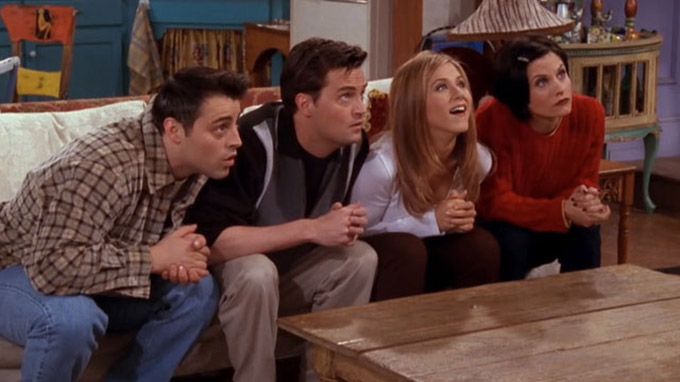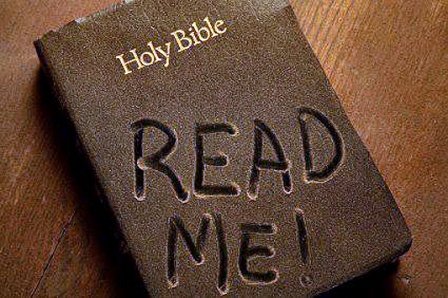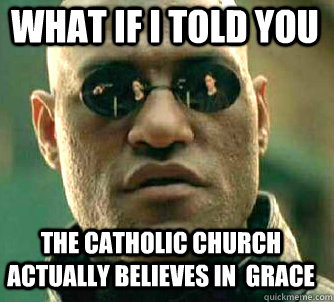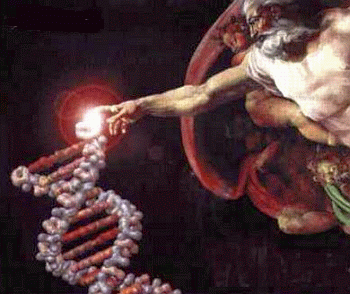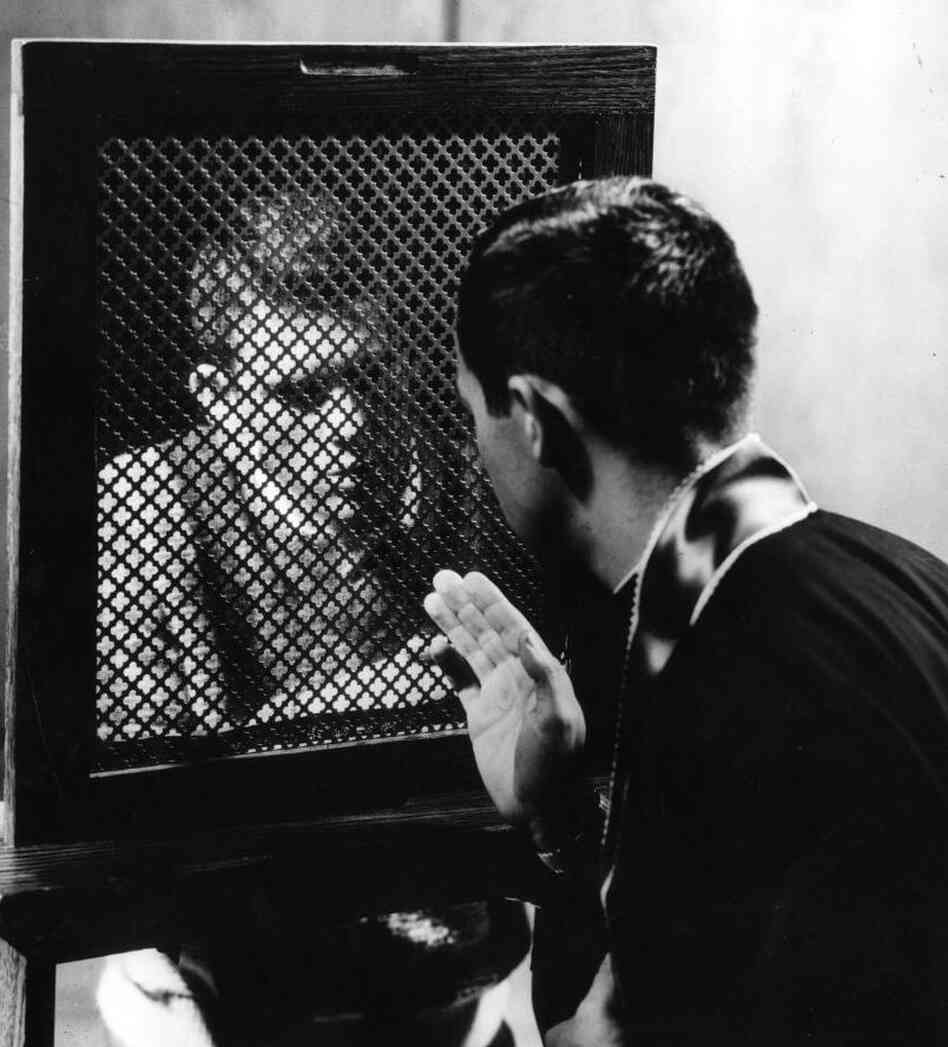It is a joke so common that even Catholics make it on themselves… and then they laugh. And the punchline always goes something like this; "…Because Catholics
don't read their Bible (insert laughter here)." This is less true today than it used to be, but it nevertheless remains a serious issue. It's one of those hilarious things that really isn't hilarious when you get right down to it. There are any number of historical reasons for this, but regardless, the fact remains most Catholics are generally incapable of engaging in a real Biblical dialogue with their Protestant brothers and sisters. Many are the problems that result from this ignorance. Most significantly, it creates a language barrier between two baptized persons where there should be a bridge. Secondly, it renders Catholics incapable of recognizing that they- in many ways- take the Bible far more literally (and thus seriously) than non-Catholics. What I mean to suggest is that one of the grave dangers of denominationalism is that it threatens to reduce Scripture to one giant list of parables and sayings. Most Catholics are used to being challenged by Evangelicals when it comes to their knowledge (or lack thereof) of Scripture, but in this post I would like to attempt the reverse. The following questions are like a conversation starter, an opportunity not only for Catholics to provide a justification for their convictions, but also for our Protestants brothers and sisters to do likewise.

1. How do you know that the Bible is truly the Word of God?
If you want to get right down to the heart of the dispute between Catholics and Protestants, do not begin by discussing who has the authority to interpret the Bible, rather begin by discussing who has the authority to compile a book and then call it the infallible Word of God. Quite often Christians presuppose that the Bible is holy without even considering why they believe it to be in the first place. I wrote a book yesterday, and God dictated every word of it to me. Presto. The Bible. Calling something God's word doesn't necessarily make it so. What also doesn't necessarily make it so is this; a) you feel like it's true in your heart, b) the book has been around a long time, or c) a lot of people really like the book. Only someone who has been given the authority by the Author Himself can actually determine what is authoritative.
2. Jesus had one clear "death bed" request- why don't Protestants generally keep it?

If a loved one had a dying wish, would you not do everything in your power to follow it to the letter? So how much more should we attempt to fulfill the dying wish of our Lord and Savior? Obviously people can debate whether or not they believe in the "real Presence" (a question I will take up later), but what is undeniable is the fact that the "breaking of the bread" was an integral part of the Church from the very beginning. And none of this should be terribly surprising to us, especially considering Jesus' clear mandate on the night before he died; "DO THIS IN MEMORY OF ME". However, if you still doubt that the celebration of the Eucharist was an integral part of the worship of the early Church, simply observe this passage from the Book of Acts (a book which details the behavior of the disciples immediately after Pentecost); "And they remained faithful to the teaching of the Apostles, to the fellowship, to the breaking of the bread, and to the prayers." (Act 2:42).
3. If the Catholic Church really believed that men could save themselves, then why would they have gone to such trouble to condemn that position?
One area of disagreement between Catholics and Protestants that should actually be an area of agreement is the question of how a man is saved. Yet if you were to ask representatives from both sides of the issue, you would almost inevitably come away with a very different impression; "Catholics believe that men are saved by
works, while Protestants believe that we are saved by
faith alone." And this would seem to be an accurate characterization, but for one minor detail- it's not. Both Catholics and Protestants actually believe that a man is saved, first and foremost, by grace. What the dispute really comes down to is whether or not we as individuals have any role in that process, and if so, what is it? All the same, the mistake that most Catholics make when discussing the issue is that they actually accept the heretical doctrine that is imposed upon them. In other words, when a Protestant calls him a heretic for claiming that men are saved by works, he actually defends that position saying; "Well, there's a good reason we believe that men are saved by works…" Ironically, Catholics have an even more compelling reason (than Protestants) to oppose "works righteousness." For it was the Catholic Church, long before the Protestant Reformation, that condemned that position in 431 A.D. at the Council of Ephesus.
4. If the Church is really "pro idolatry," then why does the Church condemn idolatry?
Many of the accusations that fall upon the Catholic Church are things that the she herself actually rejects. Idolatry is one of them. From the Catholic perspective, if you worship Mary, then you are practicing idolatry, and that's clearly wrong. If you use a saint's medal like some sort of talisman, or rabbit's foot, you are practicing superstition. Obviously there are some forms of idolatry which are much worse than others. For example, if you immolate a child on an altar in the name of Baal, then that's a serious issue. If, however, you bury a statue of St. Joseph upside down in order to sell your house (depending on your intention), then you may be bordering on a much milder form of it. The problem isn't that Catholics worship statues (which they don't), or even that they worship men. The problem is that we really do take seriously the implications of the Incarnation, and we really do believe that as a result of Christ coming in the flesh, the world of matter has been redeemed by God. Baptism has literally drawn us into one giant family of faith, and so by honoring any one member of that family, we are no more worshipping those figures than we are worshipping our older siblings by looking
up to them. In fact, to honor our spiritual fathers and mothers is a genuine act of faith, a powerful affirmation that Baptism actually accomplishes what it claims to, and that the following statement from the Gospel of Mark is anything but a form of empty rhetoric; "Whoever does God's will is my brother, sister, and mother." (Mark 3:35)
5. If there is only one Mediator between God and man, then why did God give us guardian angels?
One of the major concerns that Evangelicals express regarding the Catholic doctrine of "intercession" is that it appears to threaten the absolute sovereignty of God, or at minimum, rob Him of the honor that he is due. They contend that if you say that something other than Jesus can assist you on the road to salvation, then you are robbing God of his glory. First, it should be pointed out that Catholics also believe (as is consistent with the words of Scripture) that Jesus Christ is the sole Mediator between God and man. We also believe that there is no other Savior besides Jesus Christ. And we also believe that God is God, and man is man, and that without God we are nothing. Assuming that all of this true, should this therefore lead us to the conclusion that God rides solo in his work of Redemption? Everything in the Bible cries out against this position. Even our Lord, during his terrible agony in the garden, was assisted by an angel, who was sent from the Father in order to "strengthen" him. God initiates everything of course, but he nevertheless invites all of his creatures to share in His marvelous plan. Presumably God could effect the same outcome without giving us a guardian angel to assist us, but for whatever reason he chooses to invite all of his creatures (not just angels) to share in his saving power.
6. If the plain words of Scripture are so obvious, then why are there so many denominations in existence today?
The unity that seems to exist among Protestant denominations is less about doctrinal unity than it is about a shared rejection of papal authority. For most non-Catholic Christians, Scripture is the sole source of authority, and while this may seem like an expedient measure to create a consensus among Christians, in truth it has only served to exacerbate and proliferate the divisions. If there is no
one who is infallible, then
everyone is. This would seem to be in direct opposition to our Lord's will, when he prayed to the Father; "that they may all be one" (John 17:21).
7. The majority of Evangelical Christians subscribe to five "solas" (i.e. Scripture alone, Grace alone, Christ alone, Faith alone, and glory to God alone). How is this not a logical contradiction?
A nifty and concise summary of the Faith is a great thing, but there is always a danger whenever you attempt to reduce something that is intellectually rich and complex to something which is little more than a clever catch phrase (see TULIP). Originally there were only three "solas" (not to be confused with the three tenors), then two more were added to the mix in the past century… which is why it is unwise to create a neat and tidy formula for something which defies a simple explanation. You start with one "sola" and the next thing you know you have five, and then everyone's wondering why you are still calling it "sola".
8. Where in the Bible does it teach Sola Scriptura? I thought we were supposed to believe in "Christ alone"?

It is interesting to note that among the five "solas", only one actually mentions the Lord by name (and that wasn't introduced until the 20th century). Thus, even the Bible can become a form of idolatry, especially when an individual separates it from the One about whom it is written. Yes, if you love the Bible (i.e. Scripture alone) more than you love Jesus Christ, then you too are an idolater.
9. Where in Scripture does Christ actually command his apostles to write Scripture?
I'll give you a hint... he doesn't. However, what Christ does command (other than the Eucharist) is this; a) that we make disciples of all nations; b) that we baptize them in the name of the Father and the Son and the Holy Spirit and; c) that we teach them to obey everything that Christ has commanded" (Matthew 28:19-20). This is of course not to diminish the weight of the infallible word of God, but rather to point out that it is the teaching, and not merely the writing itself, that leads us to salvation.
10. Many Evangelicals claim that the doctrine of the Holy Trinity is easily discernible by reading Sacred Scripture. If this is the case then why did it take in excess of four hundred years to define it?

The Blessed Trinity is the central mystery of the Christian Faith, and yet it was not fully defined (as far as it can be "fully defined") until several centuries after the resurrection of Christ. This doesn't even include the fact that the Creed, which sought to clarify the Church's teaching on the divinity of Christ, was also not fully formulated until some three hundred years after the resurrection. And we haven't even begun to discuss how long it took to determine the canon of Scripture. If you consider the fact that some of the greatest minds (as well as believers) that the Church has ever known tried their best to tackle these great mysteries (with the help of the Holy Spirit), and it took them this long to do it, then how reasonable is it to conclude that the Bible is some self-explanatory textbook? The Bible for Dummies, really? The Church is rather like a seed that is continually developing, all while maintaining its original integrity. It is not merely some dusty antiquated archeological exhibit, but rather a living breathing growing reality capable of speaking to, and bringing about the transformation of, every age and culture. This interpretation of the Faith would in any case seem inevitable if you study the historical development of Christian doctrine.
11. Why do so many Protestants have a problem with priestly celibacy- especially considering the fact that Our Lord so clearly taught it?

In keeping with the remarkable and revolutionary words of the Gospel, St. Paul seemed equally adamant about the value of priestly celibacy. In fact, not only was he himself a celibate, but he recommended it (while not disparaging the good of marriage) as the preferred way to follow Jesus with an undivided heart (see 1 Corinthians 7:8). Yet, as suggested before, this recommendation was not merely some Pauline idiosyncrasy, by rather an extension of what Jesus had already said in the Gospel of St. Matthew; "For there are eunuchs that are born that way from their mother; and there are eunuchs that are made that way by other men; and there are also eunuchs that made themselves that way for the sake of the kingdom. He who is able to accept this, should accept this"(Matthew 19:12). Agreed.
12. Jesus states that those who divorce and remarry (with a few notable exceptions) enter into an adulterous relationship. Why is it that so many Evangelicals essentially ignore this clear injunction?
This is a difficult teaching by anyone's standards, but it is also something that Jesus undeniably said, which begs the question: why is this clear teaching of the Bible so roundly ignored by many Protestants?
13. If two Protestants come to a contradictory position on some essential teaching of the Faith, how do they determine which position is correct?
No this is not the beginning of some barroom joke, but rather a dilemma which is no doubt rife with countless ironies. For example, in the Gospel of John it says; "Truly, truly I say to you, that unless one is born of water and the Holy Spirit, one cannot enter the kingdom of God." Whatever you believe about the significance of this passage, getting the interpretation correct would seem to be imperative. Some Christians say that the larger context reveals the necessity of sacramental Baptism, while others claim that the physical act itself in the end is unnecessary. Presuming that both parties are sincere and well intentioned, how does one determine the right course of action without a definitive authority? Do we simply assume that the "road to heaven is paved with good intentions?"
14. If the Eucharist is purely a symbolic gesture, then why does St. Paul issue such a stern warning; "So then, whoever eats the bread or drinks the cup in an unworthy manner will be guilty of sinning against the body and blood of the Lord... That is why many of you are weak and sick and some among you have even died."

In John Chapter 6 we discover that some of Jesus' disciples decide to "return to their former way of life" because they would prefer not to "gnaw" on Jesus' flesh and drink his blood. In other words, those who listen to Him are fundamentalists, for they take everything that he is saying literally. However, most fundamentalists today choose not to take him literally, even though it is patently obvious that everyone in that Gospel passage did (including the apostles). Lending further credence to this interpretation is the fact that Jesus does nothing to correct it. Yet even if you believe there is some interpretative wiggle room here, simply consider the words that St. Paul spoke to the early Church about it (see above). Thus, if the Eucharist were purely a symbol, and Jesus were simply being metaphorical here, then why, as St. Paul so forcefully puts it, would someone be guilty of desecrating the very flesh and blood of God- if in truth they were only receiving a glorified cracker in the wrong manner?
15. If the first letter to the Corinthians says that the greatest of virtues is love, and Matthew 25 tells us that we will be judged based primarily on our charitable deeds (or lack thereof), then how can one argue convincingly that faith alone, and not both faith and works, is at the core of what saves us?

As stated before, what ultimately saves us is
God's grace, but then the next question arises: what is our part in the salvation process? Well, unless you believe that men are a little more than a bunch of glorified robots without any discernible free will, then you must acknowledge that we have a part in our own salvation… by the grace of God. The only question then becomes how does that process shake out. Is it a one-off acceptance of Christ, or is it more like a wedding vow, which requires continual care and effort so that the initial vow continues to deepen and grow as opposed to withering? Scripture certainly trumpets faith, but it also clearly celebrates
faith in action. Faith precedes a "faithful action" in the order of things, but that nevertheless does not mean that the only important thing to emphasize is faith, as if it could exist as a solitary thing. Can you find plenty of passages that discuss the importance of faith? Of course! Can you find plenty of passages that emphasize the value of works. Of course! Hence, why pit them against each other as if two Biblical virtues could be enemies? Indeed, these two virtues are no more meant to be at odds than are two book ends, two arms of a body, or two wings of a bird.
16. Apart from St. Peter in the Gospels, where else in Scripture does God change someone's name?

Many individuals mistakenly believe that God changed Saul's name to "Paul" after his conversion, but there is a very practical reason for his "name change" (and it has little to do with a divine mandate). Paul was preaching primarily to Gentiles, and so he used the Romanized version of his name in order to set them at ease in his presence (Paul was a Roman citizen as well as a Jew). It is quite possible that the Zebedee brothers, James and John, may have received a nickname from our Lord (viz. the sons of thunder), but that was more of a humorous description of their "thunderous" nature. In any case, having a nickname isn't equivalent to a name change, for a nickname is generally meant to be (more than anything else) a playful descriptor. In truth, the only time we see such an exceptional intervention in the Old Testament is with the Patriarchs. The first such name change occurred with our "Father in Faith", Abraham, whose name was formally Abram. This change had nothing to do with God's personal taste in names, but was rather about God revealing Abram's vocation. Names are in a certain sense related to our identity. Thus, in this singular act, God was revealing, not only the destiny of Abram, but the destiny of a people which would one day come to be known as Israel. He who was formerly childless, now, according to God's promise (as expressed through his new name), was to become the "father of many nations". In a similar fashion, the apostle Simon had his name changed as well. And he, like Abraham, was promised an enduring legacy. Certainly at that moment, neither one of them could have suspected what all this could mean, and yet, in spite of their limited understanding, and spite of their personal failings, God's incredible promise still seems manifestly alive in the person of the successor to St. Peter (who himself is the truly the father/papa of many nations).
17. If Christ wasn't truly intending to establish the papacy by changing Simon's name to Peter and giving him the keys to the kingdom, then what in fact was he doing there?
The modern consequence of Biblical fundamentalism is not greater fidelity to Scripture, but a temptation to reduce everything in Scripture to the broadest and vaguest kind of symbolism. "Who is Jesus speaking to here? Oh, he really means this passage for all Christians. That whole rock thing is a reference to Jesus being our Rock like in the Old Testament, and the 'keys to the kingdom' are meant to suggest that Christians are being given the keys to all of the mysteries of the Faith." Of course there is certain truth to all of these statements (and many like them), but there is also the more immediate meaning and context of a passage. Whatever else you believe about Simon's name, one thing is undeniable, his name, and no one else's is changed to "rock". Some claim that Jesus really changed Simon's name to "pebble" to indicate how insignificant Peter was and that's why he did it. Ouch! The question is why would he do this right after he had just praised Simon for recognizing his divinity. "Wow, great job Simon! No human has revealed this to you, but my heavenly Father! You worthless useless shaving of sediment, you! Yes, it is possible to twist and turn your way out of the former explanation. It is possible to claim that the rock and the keys are just pleasant little metaphors, which ultimately amount to nothing. But if we take Scripture seriously, and if we examine both Old and New Testament together, and if we acknowledge the remarkable resiliency of the papacy, it would seem that the most rational course for us to take would be to recognize that Peter was given a special role/office among the apostles. Yes, the other apostle have authority as well, but Matthew 16 seems to impute something special to Peter, while taking nothing away from the others.
18. If Scripture tells us that Mary is "most blessed among women", and that she is "the mother of our Lord", and that she is a woman that all generations will call "blessed", then who is being unbiblical by not honoring her in these ways?
Clearly there is more to the debate than these particular passages. However, what is also clear is that Marian devotion, or at least the seeds of it, are rooted in Scripture. In other words, if even the angel Gabriel can say the Hail Mary, then I think it's OK for us too. The truth is Marian devotion can be better understood by the instincts of the heart rather than from a forensic reading of Scripture. Anyhow, even from a strictly manualistic point of view, there is plenty of justification for a rudimentary devotion to her.
In the order of time, as clearly articulated by the joyful greeting of Elizabeth, Mary really
is the Mother of God/the Lord. To say that Mary is only the mother of Jesus' humanity is to fall into an old heresy concerning the nature of Christ (i.e. Jesus does not have a split personality and he is not Sybil). Of all the woman that have walked the earth, she is the greatest, and should be honored as such by all. We honor our own mothers as great- well Mary is the Mother of all mothers. In the Gospel of Luke, she even prophecies that all generations will call her "blessed". Now an evangelical Christian may not want to direct their prayers to Mary, but they should at least be willing to fulfill this Biblical prophecy by calling her; "The Blessed Mother", or at least, "Blessed Mary". We give people titles all the time who are far less worthy, and we can't give the mother of our Lord one that is right out of the Bible?
19. If everyone in heaven is destined to receive the gifts of redemption (i.e. destined to be without sin, assumed into heaven, and in complete communion with God), then why should it be so difficult to imagine that the woman who bore the Redeemer, would be the first to receive them?
Because Mary was the first in whom the Lord was born, she was naturally the first one to be born into Him. Redemption, as it were, was woven into her DNA from the first; a truth fully evidenced by the fact that our Redeemer received His DNA directly from her! You can deny it of course, but then what you are denying is the full implications of the Incarnation. Biology is, at least in this case, theology. Indeed, the two were woven of the same cloth. Thus, if God ultimately wipes away everything that separates us from him, then are not the doctrines of Mary ultimately a living sign (in the person of Mary) of what our reconciliation looks like. Indeed, She is the perfect image of a humanity reconciled to God.
20. Where in Scripture does it say that God's judgment (for good or ill) involves no amount of suffering or punishment on our part?
When Catholics and Protestants debate purgatory, they often assume (on both sides I might add) that purgatory is a lot like a middle ground between heaven and hell- or at best some bland waiting room at the doctor's office. I would argue that it is more like going to the doctor- who then gives you your rehabilitation assignment (think football player recovering from an ACL/MCL tear). Rather than some murky middle ground between heaven and hell, purgatory is more like the experience of God's purifying love/judgment. And whatever you think about the evidence for it in Scripture, what there is absolutely no evidence for in Scripture is a vision of judgment that has you sitting back and enjoying a replay of your life, all while consuming a giant bag of popcorn and receiving a pat on the back. There is plenty of Scriptural evidence, however, for something like a "refiner's fire" turning the dross of our sins into the pure gold of the spirit. Perhaps that "fire" successfully refines you in this life, but whatever the case, Scripture offers no evidence that when you meet God face to face, that that experience will simply involve God either smiling or frowning and yelling "NEXT!" Does one really believe that they will suffer nothing on judgment day upon seeing the real effects that our personal sins have had on the fate of others?
21. Where in the Bible does it state that our sins should be confessed only to ourselves?
The usual question goes something like this; "Where in the Bible does it say that you need to go to a priest to confess your sins?" And then you go around and around because the other individual isn't satisfied by your response. Yet ironically there is far more evidence in Scripture for the latter than the former. Pretty much every aspect of the faith involves some kind of confession, and the early Church's witness bears this out. Whether it was people going to the Jordan to
confess their sins to St. John the Baptist, or it was St. Paul talking about believing in your heart and
proclaiming with your lips. As with most things in these Scriptural debates it is not an issue of either/or but both/and. It is the external as well as the internal, the human as well as the spiritual. In the letter of St. James, the writer declares "confess your sins to one another" (James 5:16). "Confession" is everywhere in the New Testament. Of course one can experience all of this in the recess of their hearts, but of its nature, confessing is clearly an action of the lips, and not just a movement of the heart. The proclamation of the lips brings to completion the action that was initiated in the heart. Even if you read these texts on confession in the most minimalistic fashion, you should still come away recognizing that an outward manifestation of repentance is absolutely imperative. Yet, Scripturally speaking, when it comes to the more serious sins, there is necessarily a greater demand on our part. After all, God knows just how dishonest we can be when we are the arbiters of our own absolution. How much more humility is required for a man to go to the Church and call himself out in front of God's minister (who is both God's representative and the representative of the faithful)? Biblically speaking, the most obvious instance of Christ instituting this sacrament comes to us from the upper room after he is raised from the dead; "Whose sins you forgive are forgiven. Whose sins you retain are retained." Apart from the usual arguments for why this passage seems convincing- is what I would be inclined to call the genuinely odd second part of the statement. Indeed, if this weren't Christ instituting the sacrament of Reconciliation, then why would he even mention "retaining sins" (i.e. withholding forgiveness)? Indeed, where else in Scripture does Christ tell an
individual that he or she can withhold mercy or forgiveness (only God can do that right)? "How many times should we forgive sins? 70X7."
22. Where in Scripture does it condemn praying for the dead?

It is a clear violation of Scripture to engage in necromancy. Consequently, one may never seek to conjure up the dead as a means of speaking to them or attaining occult information directly from them. This is not to be compared with an apparition of a blessed soul who visits you on some heavenly assignment. In this case, God is initiating the encounter, in the prior case it is you who are attempting to reach into the grab bag of the spiritual world and pull out what have you. But is there anything in Scripture at all prohibiting human beings from actually offering blessings for our deceased loved ones? St. Thomas Aquinas was once asked by a woman whether or not there was a literal "Book of Life" in heaven with the names of all the blessed written inside. He responded to her question by saying that he did not think that such a literal book existed, but that he saw no harm in thinking so. In a similar sense, what harm could come from wishing our deceased brothers and sisters special blessings in the next life? A young relative of mine recently prayed for the "soul" of his deceased bunny. Of course his theology is a bit shaky, but is it not a pious thought (and at worst, excusable) for him to express gratitude and hope for someone (or in this case something) that had brought him great joy? Can an expression of genuine affection and love for another, especially when it involves praying for the happiness of a particular soul, ever be raised to the level of a sin? My point is we pray for those who have gone before us out of a natural instinct of love and affection. We are not engaging here some kind of twisted necromancy, or spirit conjuring (this also explains the pious practice on the part people from all persuasions who say R.I.P. when someone has died… is this not a prayer also?). We are praying that God's face shines upon them. And if they have it already, then so be it, what is the harm of sending a spiritual bouquet to the ones we love? The Jews developed this practice (see 2 Maccabees 12:46-58) centuries before the birth of Christ, and they still do it today (they call it the Kaddish). St. Paul apparently expressed this same desire when he sought God's mercy for his deceased friend Onesimus (2 Timothy 1:18). The 2nd century Christians expressed this hope when they carved intercessory prayers on the walls of the Roman catacombs. Is it really a sin against faith in God to pray that His mercy would fall like the dew upon the souls of our deceased loved ones? St. Paul didn't seem to think so.
23. Where does the phrase "once saved always saved" appear in Scripture?

As far as I am aware this phrase does not appear in Scripture. Rather this belief is deduced from a series of passages like the following; "My sheep hear my voice… and I give them eternal life… and no one will snatch them our of my hand" (John 10:28-29). What we have here- once again- is a false dichotomy; Scripture pitted against Scripture, when they should be in concert with one another. It is a little like a scene from the movie
Liar Liar, where Jim Carrey beats himself up in order to avoid having to stand trial. Are there passages in Scripture that suggest salvation happens at a definitive point in time? Yes; "Today salvation has come to your house…" Are there passages that suggest that it is process, and that one must persevere and "run the race, so as to win... lest we find ourselves "disqualified"? Absolutely. Therefore, how do you best express this paradox? How do you explain to someone that Baptism is the gift of being saved by God, while also explaining that, like any gift, you can abuse it and thus lose it. That is what free will is in a nutshell. Free will doesn't cease to be the moment that you accept Jesus into your heart anymore than the challenge of marriage ends the moment you decide to take the plunge.
24. How do you prove that a man is saved?
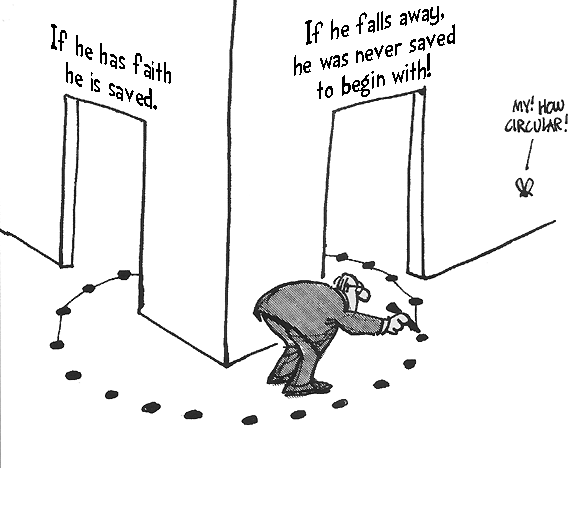
How does someone know incontrovertibly if they are saved or not? Now we have truly come full circle, both literally and figuratively. We began this list of questions with circular logic and thus we will conclude with it. When you ask an evangelical how someone can tell if they are saved, they usually point to some sort of profession of faith that they made at their church, or else some particular moment that they remember where they "accepted Jesus into their heart and professed him with their lips." By this standard I too can point to a moment wherein I accepted Jesus into my heart and professed him with my lips. However, a problem arises when you ask many evangelicals about the phenomena wherein someone appears to be saved, but then they inexplicably go on a killing spree (or some other horrible thing). At this point, they will in all likelihood take one of two possible positions. Either they will still with Luther's original line of thinking; "No sin can separate us from Him, even if we were to kill or commit adultery thousands of times each day", or they will take up the more popular (though circular) position, that the person, even while appearing so, was probably never saved in the first place. Yet if they argue the latter, then what you have is a bit of a merry-go-round type argument, which, in the irony of ironies, seems a little Pelagian. How do you know that a man is saved? Because he has accepted Christ into his heart. What if after accepting Christ he becomes an adulterer or a serial killer? Well then, he wasn't sincere in coming to Christ. Then how do you know if he was sincere or not? His life will reflect that sincerity… Repeat and rinse.
25. Where is the Scriptural basis for serving grape juice instead of wine at communion?

I am not sure how many churches still do this, but there is a practice among some evangelicals Christians (particularly Baptists) wherein their custom is to serve grape juice instead of wine at communion. This is certainly a perplexing practice, especially when you consider it in light of the overwhelming evidence for the holy consumption of wine in Scripture. After all, why was Jesus accused of being a "glutton and a drunkard" if he was simply drinking Juicy-Juice at dinner? And if Jesus was truly a teetotaler, does that mean that his first miracle at Cana involved changing water into Welch's (how disappointed the guests must have been)? And then what about the cup of wine at the Last Supper, shall we assume here that Jesus changed the wine, not into his own blood, but back into a more reputable drink? All of this to say- I can find no evidence in Scripture that Jesus Himself was averse to fermented beverages.


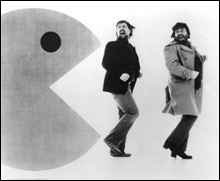

.gif)

